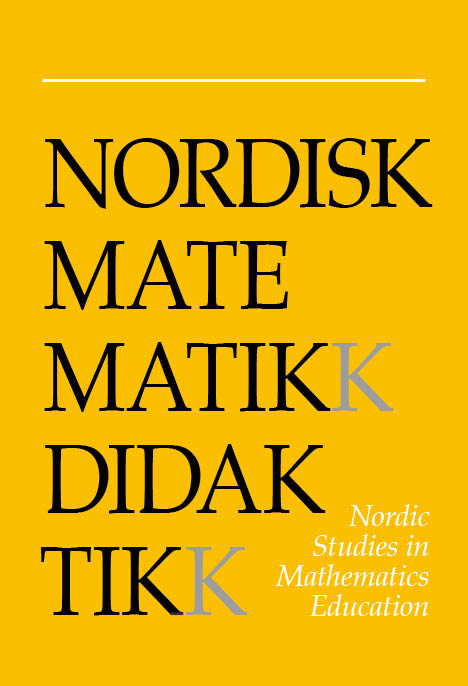Social konstruktivism som grund för matematikundervisning
DOI:
https://doi.org/10.7146/nomad.v1i1.144986Abstract
Mot bakgrund av huvudidéerna hos olika konstruktivistiska riktningar väljes den sociala konstruktivismen som utgångspunkt för en härledning av didaktiska prin- ciper för undervisning i matematik. Matematiken ses som en social konstruktion, en särpräglad del av den kollektiva kunskap som människan konstruerat för att överleva som art och som fortlever och utvecklas bunden till en viss kultur. Växel- verkan mellan denna kollektiva kunskap och individens konstruktion av kunskap är central för de didaktiska konsekvenserna. Denna artikel baserar sig på ett bidrag till ett symposium i matematisk och naturvetenskaplig didaktik arrangerat vid Insti- tutionen för lärarutbildning, Åbo Akademi, Vasa, 26 - 27.9. 1991, och har i en något avvikande form publicerats i symposiets proceedings.
References
Björkqvist, O. (1990). Generativ inlärning som didaktisk utgångspunkt. I K. Baalsrud m. fl. (Red.), Naturfag i skolen. Framskritt og fornyelse (s 259-263), Oslo: Universitetet i Oslo.
Björkqvist, O. (1992). Forskning och utvecklingsarbete i de matematiska ämnenas didaktik (Rapport nr 2, 1992). Vasa: Pedagogiska fakulteten, Åbo Akademi.
Bloor, D. (1976). Knowledge and social imagery. London: Routledge & Kegan Paul.
Ernest, P. (1990). Social constructivism as a philosophy of mathematics. Radical construc- tivism rehabilitated? In G. Booker, P. Cobb, & T. N. de Mendicuti (Eds.), Proceedings of the Fourteenth PME Conference,Volume I (p. 221), México.
Ernest, P. (1991). The philosophy of mathematics education. Basingstoke: The Falmer Press.
von Glasersfeld, E. (1987). Learning as a constructive activity. In C. Janvier. (Ed.), Pro- blems of representation in the teaching and learning of mathematics (pp. 3-17). Hillsdale, NJ: Lawrence Erlbaum.
Keranto, T. (1990) Kontekstuaalinen lähestymistapa matematiikanopetukseen. Dimensio, 54(4), 16-20.
Lakatos, I. (1978). Mathematics, science and epistemology (Philosophical Papers Vol. 2). Cambridge: Cambridge University Press. https://doi.org/10.1017/CBO9780511624926
Lerman, S. (1989). Constructivism, mathematics, and mathematics education. Educational Studies in Mathematics, 20, 211-223. https://doi.org/10.1007/BF00579463
Osborne, R., & Wittrock, M. (1983). Learning science: A generative process. Science Education, 67(4), 489-508. https://doi.org/10.1002/sce.3730670406
Popper, K. (1979). Objective knowledge. Oxford: Oxford University Press.
Restivo, S. (1988). The social construction of mathematics. Zentralblatt für Didaktik der Mathematik, 20(1), 15-19.
Solomon, J. (1987). Social influences on the construction of pupils ́ understanding of science.Studies in Science Education, 14, 63-82. https://doi.org/10.1080/03057268708559939
Weinberg, D., & Gavelek, J. (1987). A social constructivist theory of instruction and the development of mathematical cognition. In J. C. Bergeron, N. Herscovies, & C. Kieran (Eds.), Proceedings of the Eleventh PME Conference, Volume III (pp. 346-352), Montréal.
Wheatley, G. (1991). Constructivist perspectives on science and mathematics learning. Science Education, 75(1), 9-21. https://doi.org/10.1002/sce.3730750103
Downloads
Published
How to Cite
Issue
Section
License

This work is licensed under a Creative Commons Attribution-NonCommercial-ShareAlike 4.0 International License.



